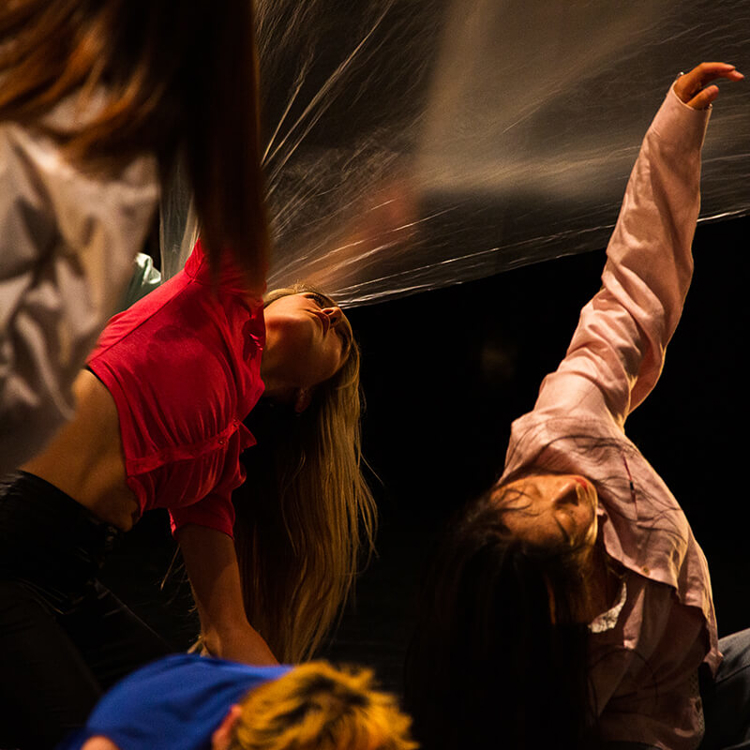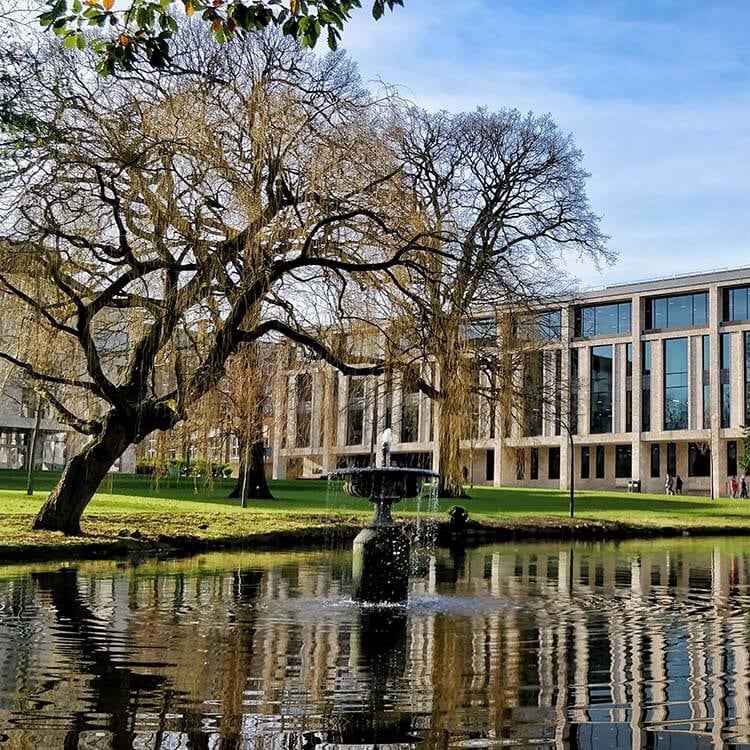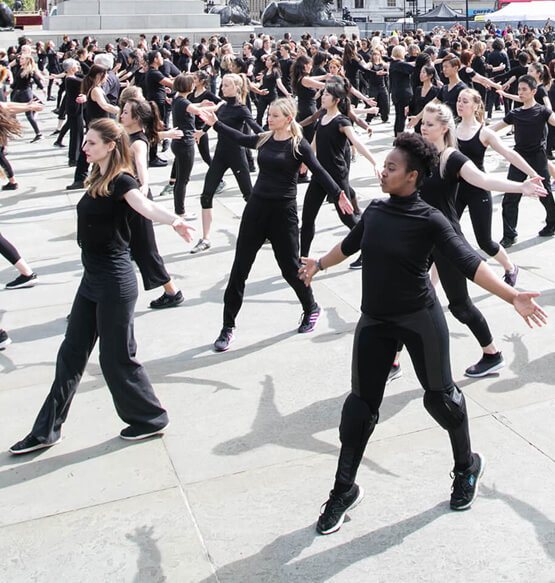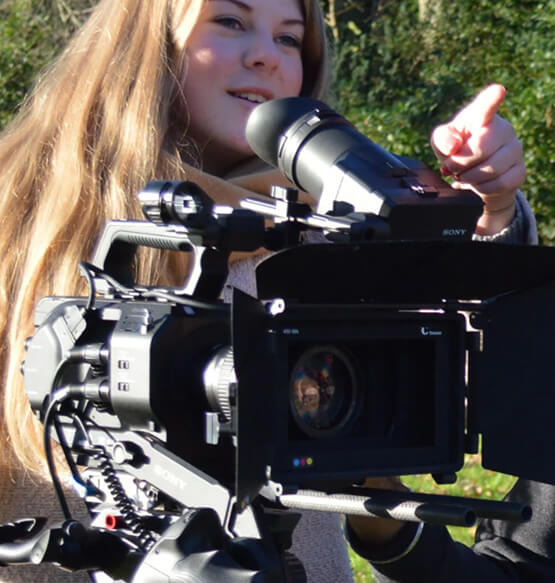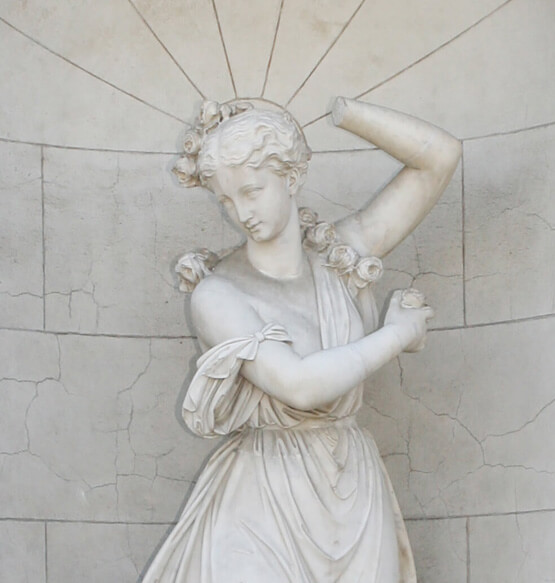Entry tariff:
240 credits
UCAS code:
W510
Start date(s):
September 2026
Dance at Roehampton is world-renowned, where you will join a diverse and inspiring community of staff and students. This is where you will foster academic and artistic excellence, creativity and innovation. This is a one year top-up programme.
Did you know?
We are ranked number one in the UK for the impact of our research in dance (Research Excellence Framework 2021).

You’ll learn from leading artists and researchers through an innovative, wide-ranging curriculum that sets you up to thrive in your dance and arts career.
You will engage in a comprehensive study of dance, integrating theory with dance practice in a vibrant, tight-knit community.
The skills you'll develop include those around:
- Dance forms
- Contact improvisation
- Release technique
- Ballet
You'll be encouraged to reflect on dance in imaginative ways and develop your analytical skills – for instance, by considering how dance both shapes and is shaped by society, or how choreographers respond to a multicultural and globalised environment.
Modules
Module overview:
This module provides a framework for you to explore your advanced movement potential using a variety of approaches drawn from a range of dance contemporary, commercial and somatic practices with consideration to global perspectives. The technical, performative, improvisational and interpretative challenges of dancing are scrutinised and the interplay between physical, imaginative, observation and analytical skills is interrogated and developed. The module articulates questions about how dancers experience movement quality in relation to space and time and how detailed embodiment of movement arises through testing (trial and error) and safe and effective practice. Alongside a personal practice, the module will propel you to advance your skills and engage with expressive and interpretative group tasks in relationship to music, sound accompaniment, or text and to find methods of working with awareness and sensitivity in relationships with other dancers. Acknowledging dance’s potential within an interdisciplinary, professional and commercial context, dancers will gain advanced confidence in working with music and understand principles of collaboration in art making.
The continuity of ‘training’ through regular classes prepares you for the physical and mental demands of the various roles within the profession, such as navigating a portfolio career, as a dance artist such as performer, choreographer, teacher or community artist, as well as in related professional areas, in health, education, fitness, well-being sectors, or in related roles in the creative industries, including fashion, social media, design, commercials and video games.
It also asks transferrable soft skills such as resilience, critical self-reflection, adaptability and flexibility as well as an awareness for selfcare and safeguarding a healthy practice.
How you’ll learn:
You’ll learn through weekly practical classes.
Module overview:
This module supports your individual artistic voices to flourish as you build on compositional abilities developed throughout the programme. You will further advance their skills in choreography, technical production and applied lighting, as well as in Screendance, to explore and realise their full artistic vision. You are supported to refine your own choreographic style through studies that ask in what ways movement quality, dramaturgical structure, scenographic design and expression can interact. Staging is explored as the choices that can be made about how an audience encounters choreography, whether on screen, stage, gallery, or public site. Opportunities for collaboration run throughout the module as students support each other to realise creative and production elements of their projects. The module features extensive peer appraisal, drawing on different models to evaluate work and to receive feedback, including articulating one’s own choreographic intention in formats that replicate industry practices. The skills in technical production acquired in this module, and in the 2nd year module Choreography and Production, means you graduate ready to enter any dance production situation with the vocabulary and practical knowledge to engage professionally. You will create their strongest choreographic works and be ready to introduce them to the professional world.
How you’ll learn:
You’ll learn through a mix of practical choreography class and practical production and lighting classes weekly. There will be an additional 30 minutes of asynchronous digital support per week. This will consists of video examples of exemplary work for both choreography and lighting design.
Module overview:
In this module you will work on a live brief of a tutor-led choreography commission to develop a dance performance project. Cross-pollinating the practical and contextual skills and knowledge acquired from previous modules The Dance Profession in Social Contexts, Choreography, Production and Aesthetics, and Advanced Dance Practices, you will envisage, organize and develop a performance with all its accompanying aspects from digital and/or live, site-specific content creation, rehearsal and production. Working in groups, you will apply methods of devising and collaboration, exploring strategies of shared authorship and co-creation. Performance is approached in relation to trends and industry practices and can be realized either as a live event in a traditional theatre setting or an installation or a site-specific performance, or a digital event with outcomes of mediated choreography, on screen and on other digital platforms. Attention will be given to aspects of access and inclusivity, considering diverse audiences and media.
Professional practice and performance will be reinforced through technique classes, increasingly establishing an independent working attitude enabling the transition into the field after graduation. You will identify roles, and plan, curate and organize all relevant activities, such as rehearsal schedules, curation of the sharing event, promotion and documentation including programme notes, curator statements, social media content production and publicity, digital images, video content and post-performance reflections. The module offers an opportunity to gather material to develop a personal performance portfolio including a showreel, visual identity design (web presentation), and other related material.
How you’ll learn:
You’ll learn through practical dance classes and hybrid classes each week in the Spring term. The practical sessions will build your dance skills, while the hybrid sessions will focus on creating a performance event based on a tutor-led brief. You’ll also get 30 minutes of weekly asynchronous support with audio-visual resources to help develop your digital portfolio.
Module overview:
The Dance Industry exposes you to the key aspects of the dance industry and its infrastructure – teaching, community dance, festivals, dance organisations, the freelance dance artist, researching. It will offer you a rounded picture of these aspects through giving an overview of the research on the topics and analysis of the real-life contexts and issues that currently challenge the dance and arts sectors. The module will propose several case studies from the dance industry for you to engage with through research, problem solving or creative imagining. The module is designed to provide tools to think widely and deeply about professional scenarios and to learn more about the dance infrastructure in the UK and internationally. The module content draws on first year module Contemporary and Commercial Dance and second year module Dance Professions in Social Contexts, and these modules should be seen as contributing to your understanding and knowledge in The Dance Industry.
You will be taught through tutor-led seminars and workshops to enable you to gain a critical understanding and deeper knowledge of the dance industry. You will be encouraged to take a pro-active engagement in sessions, contributing to discussion and practical tasks.
How you’ll learn:
You’ll learn through a mix of seminars and experiential learning. There will be an additional 30 minutes of asynchronous digital support per week. This will consists of audio-visual and written material.
These are the current planned modules on this course and may be subject to change.
Career
During this one year top-up, you will follow your own interests, gaining a strong understanding and knowledge of dance in both theory and practice.
Your future role could be:
- Choreographer
- Dancer
- Artistic director
- Community dance artist
- Journalist
- Teacher
- Arts manager
- Arts Programmer
Whether you want to be front and centre stage, behind the lights, moulding the next generation of talent or working in policy and advocacy, our world-class BA Dance course will equip you with all the tools you need to succeed. Our degree also opens up an array of opportunities in other fields and professions by developing key transferable skills throughout your three years at Roehampton.
Our successful dance alumni include Robyn Cabaret who is a Programmer at Sadler's Wells; Tom Bowes, who works at Northern Contemporary Dance School; Ceyda Tanc who runs her own dance company; Holly Blakey, an award-winning music video choreographer and director, and Maya Pindar, dance critic and reviewer.
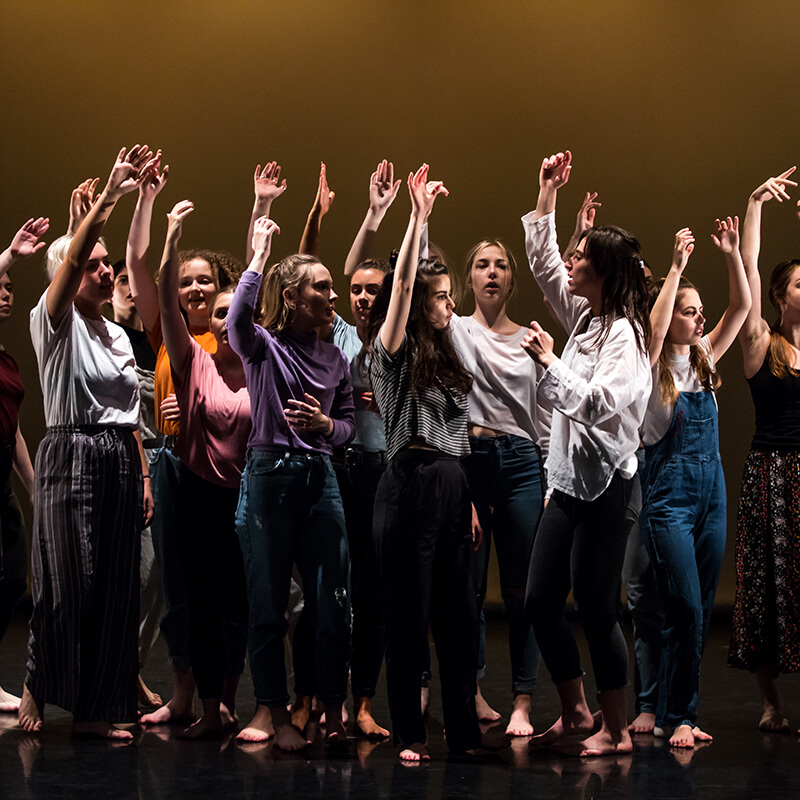
The Student Futures team is here to support you throughout your time at Roehampton and beyond.
They offer services tailored to your needs, helping you take confident steps towards your future.
You’ll have access to a wide range of career workshops and events, where you can engage with employers and develop the skills you need to succeed in the workplace.
These opportunities will help you build your CV, prepare for interviews, and connect with successful Roehampton graduates who are thriving in their careers. You’ll also be able to engage with our partners across London and beyond.
Wherever you want to go in the future, you'll be preparing for the world of work from your very first day.
Learning and assessment
How you'll learn
Your classes are led by artists and academics with qualifications from some of the world's top universities and conservatoires.
The School of Arts, Humanities and Social Sciences provides a virtually unparalleled breadth of curricular expertise.
The needs of each individual student are at the centre of the course, meaning that the course will be shaped around your own interests and ambitions, and will provide you with countless opportunities to flourish.
You will follow your own interests, gaining a strong understanding and knowledge of dance in both theory and practice. You will discover many different ways to experience dance, not only in performing, but also a variety of other roles including as an educator, artist, producer, policymaker, curator and screendance maker.
We have exciting partnerships with a host of illustrious choreographers, artists and dance companies. Our students have worked with renowned figures such as Akram Khan, Gaby Agiss, Igor and Moreno, and Rosemary Lee.

How you'll be assessed
Your assessments reflect the real-world of dance, preparing you for your future.
This includes:
- Audition-style assessments
- Live performance
- Project proposals
- Presentations of reflective ideas (live, digital, and written)
- Participation and collaborative practice
- Presentation of choreography and production skills
Dance spaces and studios
Large state-of-the-art, purpose-built dance and teaching spaces, designed for dance classes, workshops and movement exploration. Equipped with highly-sprung harlequin floors and underfloor heating.
A dedicated, well-equipped dance studio, perfect for practical dance classes and rehearsals. Equipped with highly-sprung harlequin floors, and a large TV for presentations.
Modern and accessible teaching space supporting dance theory, workshops and rehearsals.
Multipurpose hall, used for workshops, rehearsals and choreographic sharing.
Large and historic (18th-century) room used for teaching, special events and occasional performances.
Professionally rigged 350-seat theatre providing a first-rate performance venue for showcases and productions. Equipped with highly-sprung harlequin floors. Used for teaching, rehearsals and performance.
High-quality dance studio equipped with technology for rehearsals, choreography development, installations, and interdisciplinary creative practice. Equipped with highly-sprung harlequin floors and lighting rig.
Computer labs with extensive software for audio-visual editing of film and sound, and a 95-seat cinema.
Course staff
You will be taught by artists and researchers who are leading specialists in their fields and provide an excellent springboard for you to thrive in your career in dance and the arts.
Open days
Get a real taste of our campus, community and what it’s like to study at Roehampton
Applying
Full-time UK undergraduate students apply through UCAS.
Entry tariff
Looking to work out your UCAS points or find out about our entry requirements? Find out more.
When we consider applications to study with us, we form a complete view of your achievements to date, and future potential, and can offer flexibility in entry requirements. Find out more about our Contextual Offer scheme.
Specific entry requirements
-
240 credits from a level 5 qualification, a foundation degree (FdA/ FdSc) or equivalent international qualification in a relevant subject.
-
240 credits from years 1 and 2 of an undergraduate degree (BA) in a relevant subject at a different institution.
All applications will be reviewed by programme convenor to ensure appropriate background to succeed in the Dance degree offered at Roehampton.
General entry requirements
International undergraduate students apply through our direct application system.
Entry tariff
Looking to work out your UCAS points or find out about our entry requirements? Find out more.
When we consider applications to study with us, we form a complete view of your achievements to date, and future potential, and can offer flexibility in entry requirements. Find out more about our Contextual Offer scheme.
Specific entry requirements
-
240 credits from a level 5 qualification, a foundation degree (FdA/ FdSc) or equivalent international qualification in a relevant subject.
-
240 credits from years 1 and 2 of an undergraduate degree (BA) in a relevant subject at a different institution.
All applications will be reviewed by programme convenor to ensure appropriate background to succeed in the Dance degree offered at Roehampton.
General entry requirements
Fees and funding
UK students
Tuition fees
| Entry date | Undergraduate Year 1 |
|---|---|
| September 2026 | £9,790 |
Prices shown are for the first year of your degree.
Funding your studies
We also provide other ways to support the cost of living, including on-campus car parking, hardship support and some of the most affordable student accommodation and catering in London.
International students
Tuition fees
| Entry date | Undergraduate Year 1 |
|---|---|
| September 2026 | £17,628 |
Prices shown are for the first year of your degree.
Funding your studies
We also provide other ways to support the cost of living, including on-campus car parking, hardship support and some of the most affordable student accommodation and catering in London.


